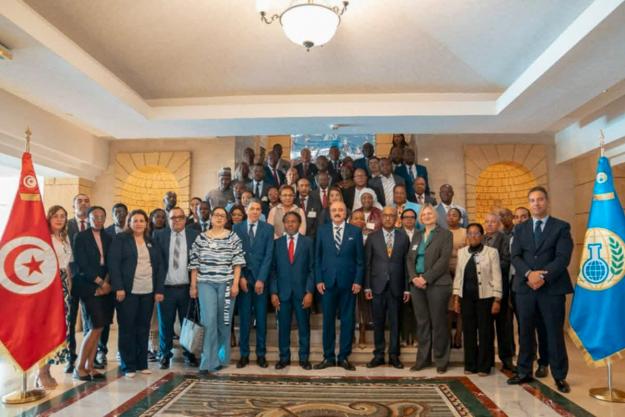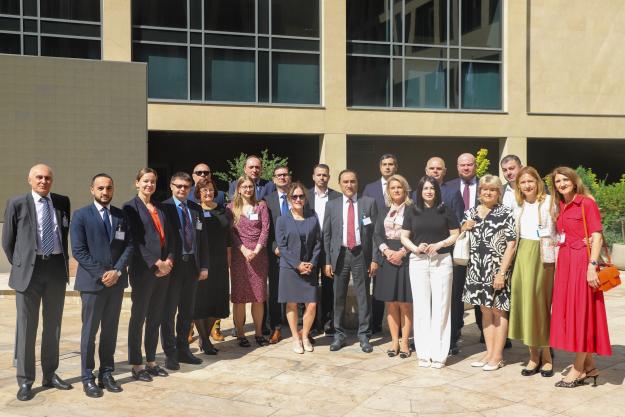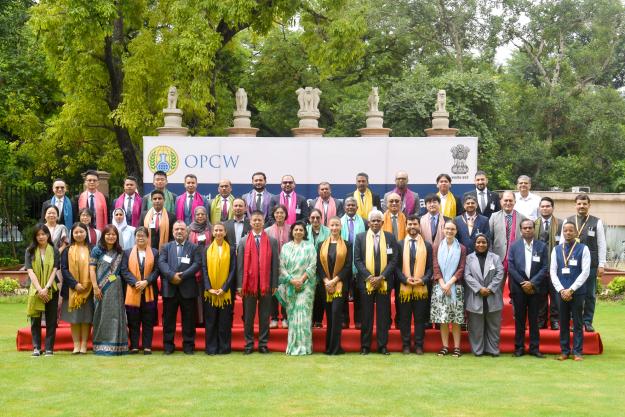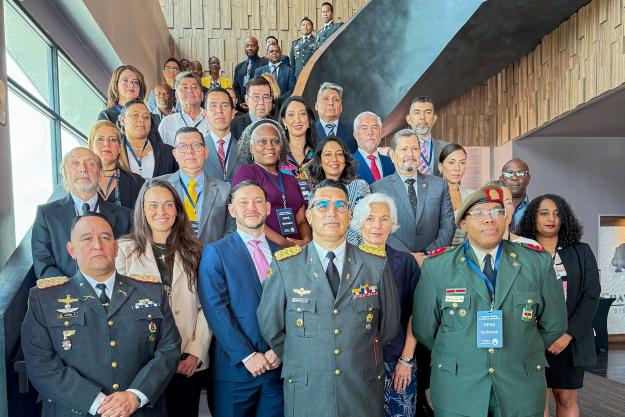THE HAGUE, Netherlands—13 August 2025—The Organisation for the Prohibition of Chemical Weapons (OPCW) has concluded its 2025 Regional Meetings of National Authorities, bringing together representatives from all regional groups to strengthen implementation of the Chemical Weapons Convention (CWC).
Held across five regions, the meetings facilitated exchange on practical cooperation mechanisms, emerging technologies and underscored a shared commitment to addressing contemporary chemical security challenges.

Africa Regional Meeting, held from 17 to 19 June 2025 in Tunis, Tunisia.
The Africa Regional Meeting, held from 17 to 19 June in Tunis, Tunisia was notable for its exceptional level of participation. The meeting drew 56 participants from 45 States Parties—the highest number among all regional events. Key developments included the recent designation of Africa’s only OPCW-designated laboratory at the National Institute of Criminalistics and Criminology in Algeria, which generated strong interest among States Parties seeking to develop similar capabilities. A standout success story emerged from Kenya’s participation in the Mentorship/Partnership Programme with India, which evolved beyond knowledge exchange to include equipment donations, scholarship funding, and broader bilateral cooperation involving diplomatic missions. However, with 27 African States Parties yet to adopt comprehensive CWC implementing legislation, constructive breakout sessions focused on legislative advancement strategies.

Eastern Europe Regional Meeting, 11–12 June, Yerevan, Armenia.
The Eastern Europe Regional Meeting held from 11 to 12 June in Yerevan, Armenia, focused on integrating new technologies to support the Technical Secretariat’s capacity-building efforts. This approach enabled the Secretariat to gather direct input from participants to align future programming with regional needs. Priority areas included cooperation with the chemical industry, national capacity for emergency response, and customs collaboration. Transfer discrepancies—a recurring issue across all regions—were also discussed. The 18 participants from 15 States Parties expressed strong interest in subregional cooperation, particularly in industry outreach and customs training, and flagged artificial intelligence and other emerging technologies as future topics of interest.

The Asia Regional Meeting was hosted by India in New Delhi from 1 to 3 July 2025.
The Asia Regional Meeting, hosted by India in New Delhi from 1 to 3 July, brought together 38 participants from 24 States Parties. The event highlighted strong regional partnerships, particularly through a panel discussion on the Mentorship/Partnership Programme, where four States Parties shared their experiences and benefits of bilateral cooperation. Addressing transfer discrepancies remained a core focus, with the Technical Secretariat continuing to support this work through global workshops. Artificial intelligence was identified by participants as a top priority for future discussion. The meeting also enabled significant bilateral engagement: 24 bilateral meetings were held between States Parties and the Technical Secretariat, reflecting the region’s strong commitment to cooperation under the Convention.
The Western Europe and Others Group (WEOG) Regional Meeting was held in hybrid format on 4 July at OPCW Headquarters in The Hague. Thirty participants from 17 States Parties discussed practical national implementation challenges. Australia presented its enhanced coordination mechanisms with border authorities, while the United States presented on its experience in overseeing a large number of chemical production facilities. Areas of shared interest included the interpretation of inspection findings, procedures for sampling and analysis, and the resolution of transfer discrepancies.

Latin America and Caribbean (GRULAC) Regional Meeting, 9–11 July 2025, Guayaquil, Ecuador
The Latin America and Caribbean (GRULAC) Regional Meeting was held from 9 to 11 July in Guayaquil, Ecuador, with 37 participants from 30 States Parties. Discussions included chemical security for large-scale events. Mexico shared its preparations for the 2026 FIFA World Cup as a practical case study of CWC implementation. A panel discussion featuring eight countries and international organisations, including INTERPOL and the Organization of American States, highlighted the importance of inter-institutional coordination. Chemical security emerged as the top regional priority, followed by the resolution of transfer discrepancies and the advancement of national CWC legislation. Interest in interregional mentorship also remained strong, with 23 States Parties expressing a willingness to participate in related initiatives. Bolivia was elected as the new GRULAC regional coordinator and will host the next regional meeting.
The 2025 Regional Meetings reaffirmed the OPCW’s role as a platform for collaboration, innovation, and capacity-building. With record participation, strengthened regional networks, and growing interest in emerging technologies, the meetings laid a strong foundation for continued progress. Building on this momentum, States Parties will next convene at the Annual Meeting of National Authorities, to be held in November 2025 at OPCW Headquarters in The Hague.
Background
According to the CWC, each State Party is required to establish or designate a National Authority to serve as the focal point for liaising with the OPCW and supporting the effective implementation of the Convention at the national level. National Authorities are responsible for coordinating activities within the State Party, including overseeing the submission of declarations, facilitating inspections, supporting the enactment and enforcement of relevant legislation, and promoting awareness and compliance among stakeholders such as industry, customs, and law enforcement. They play a central role in translating the obligations of the CWC into concrete actions within their respective countries, serving as both coordinators and gatekeepers of national compliance, and key drivers of the Convention’s objectives.
As the implementing body for the Chemical Weapons Convention, the OPCW, with its 193 Member States, oversees the global endeavour to permanently eliminate chemical weapons. Since the Convention’s entry into force in 1997, it is the most successful disarmament treaty eliminating an entire class of weapons of mass destruction.
In 2023, the OPCW verified that all chemical weapons stockpiles declared by the 193 States Parties to the Chemical Weapons Convention since 1997 — totalling 72,304 metric tonnes of chemical agents — have been irreversibly destroyed under the OPCW’s strict verification regime.
For its extensive efforts in eliminating chemical weapons, the OPCW received the 2013 Nobel Peace Prize.
